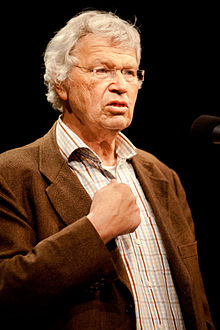Gerhard Polt | |
|---|---|
 Polt 2011 | |
| Born | 7 May 1942 |
| Occupation(s) | author, filmmaker, cabaret artist |
| Known for | Man spricht deutsch |


Gerhard Polt (born 7 May 1942 in Munich [1] ) is a German writer, filmmaker, [2] actor and satirical cabaret artist from Bavaria. [3]
Contents
Gerhard Polt's main topics are Bavarian people, culture and politics. On stage he often plays the role of an ignorant Bavarian petty bourgeoisie. One of his trademarks is the constant switching and the combining of Bavarian, Standard German and even (pseudo-) Englisch language elements (albeit always performed with strongly Bavarian pronunciation and melody), where a lot of jokes and wordplays derive from.
His performances in Munich theaters, which he started in 1976, are very popular. In 1979, he became known to a wider audience in West Germany as a result of his television comedy series Fast wia im richtigen Leben (Almost like in real life). In the following years, he was writer and actor in the movies Kehraus (1983), Man spricht deutsh [sic] [ de] (1987), Germanikus [ de] (2004), and writer and director of Herr Ober! [ de] (1992).
He's one of the most regarded and highest decorated German cabaret artists.